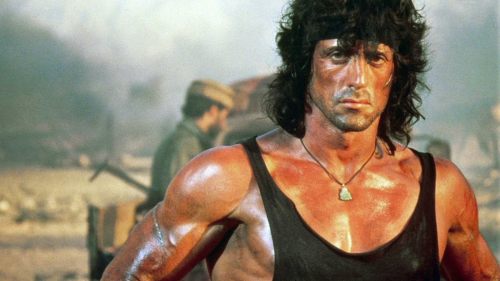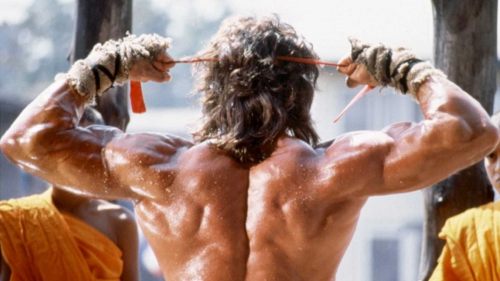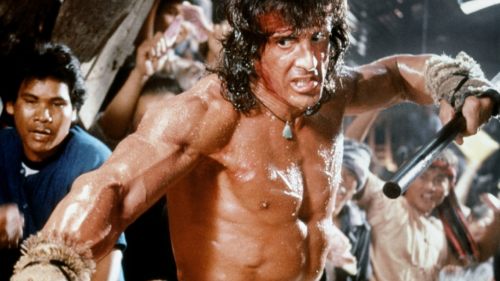The Four John Rambos
As you may have heard, Alamo Drafthouse is doing an amazing Rambo marathon leading up to the release of 2019's greatest achievement, Rambo: Last Blood. Get your tickets here!
The first time we see John Rambo, he smiles. Don’t get used to it. About the only consistent characteristics shared between the four Rambos are the length of their hair and the depth of their sadness.

It’s a tired observation now, but the John Rambo we meet in First Blood is a far cry from the man most people picture when they hear the character’s name. It doesn’t even feel accurate to call this an action film, certainly not in the sense people mean when they refer to Rambo movies as their own level of the genre. Instead, First Blood is a survival drama centered around a broken man who, stripped of both his last friend and shred of dignity in the same afternoon, decides to embrace the monster the military created out of him. He does it out of self-defense, and holds back just short of murdering anyone (we can split hairs about the film’s one casualty later), but once senses some relief in his exit from society and return to the wild. This is a man who only seems in his element once pushed to the edge.
First Blood is one of the few action movies willing to let Stallone look small. He’s wiry, skinny, nervous - more unhealthy looking than muscular. He’s still pretty strong but in Stallone terms, he’s on the minuscule side. This Rambo isn’t about offensive potential, but rather an exposed nerve you touch at your own peril. He’s reactive and not exactly in control of those responses.
The film’s plot ultimately places John Rambo outside the realm of normal society for good (or at least until Rambo: Last Blood, where he’s a free man back on American soil and apparently paying taxes and stuff), which is exactly right for the character. You can watch the film and wonder what future would await the Rambo had Brian Dennehy’s Sheriff Teasle not harassed the poor guy into resorting to his feral mania, but the point is that Rambo’s issues were probably inevitable. At the film’s opening, as he converses with his ‘Nam buddy’s widow, Rambo is barely able to even hold a conversation. He’s sad and painfully shy. He has nowhere to go and no one wants him. His last pal is dead and the closest ally the film musters (Richard Crenna’s Sam Trautman) is implicitly more villain than friend. The plot begins with him literally getting kicked out of a town called Hope and ends with him in anguished tears before being trotted off to prison, where he would soon become a cartoon character.

Within the first moments of Rambo: First Blood Part II, Colonel Trautman offers Rambo an opportunity to do POW reconnaissance in Vietnam. Just gathering intelligence, basically. Nevertheless, Rambo asks if this mission means he can finally win the Vietnam war. Instead of calling him an idiot, the supposedly intelligent Trautman tells Rambo “This time it’s up to you.” Rambo: First Blood Part II is an infinitely stupid movie, is what I’m saying.
And as such, it takes a decidedly less-nuanced approached to John Rambo. A functional surface understanding of the character gets fortified and concentrated until John Rambo becomes a full-on American superhero. Years of breaking rocks have built a much more muscular guy, and also a much more violent one. While Rambo spent most of First Blood illustrating how easily he could kill everybody, here he just goes ahead and kills everybody.
Rambo still speaks as little as possible, but a philosophical edge has been added to his rare utterances. For instance, if he’s still alive, can the Vietnam war really be dead? When faced with the axiomatic supremacy of 1980s technology, Rambo claims he prefers the human mind, even his. It turns out he’s right but only because the screenplay is picking favorites (to this day, I still don’t understand why Rambo gets hung up on his skydive, why he has to cut away his fancy equipment to save himself or why Charles Napier doubts his survival after that - maybe I’m the stupid one). Rambo even understands his place within the military, casually owning up to his expendability. He’s also surprisingly obsessed with the concept of winning. This is mentioned during his First Blood monologue, but the number of times he mentions it here changes the shade of his character a bit, as it’s not exactly underdog survivalist talk.
In the first film, circumstances put a spark to Rambo’s already-loaded powder keg. He was probably going to pop eventually but not all by himself. Here, his reasoning is less understandable. A lot is made of Rambo’s stellar military career, but he appears to have a very difficult time following orders. The idea is for Rambo to find proof POWs exist so an extraction team can rescue them. But even with a plan in place to save the men, Rambo’s emotions prevent him from doing what he’s told. Instead of taking photos, he literally says “no more orders” and just snags a POW, a move that puts the POWs he leaves behind at risk.
The movie gets away with this because the entire mission was a sham anyway. There was never any plan to extract POWs, should Rambo obtain photographic proof of their existence. When Rambo pops up with one for extraction, bureaucratic bad guy Charles Napier (what a glorious evolution up from Brian Dennehy) abandons them both to death and torture by (surprise!) Russians. Like a lot of ‘80s heroes, Rambo does the right thing by breaking the rules.
Really, Rambo: First Blood Part II’s escalation makes perfect Hollywood sense. If people loved a character who apparently was unstoppable in Vietnam, of course they’re going to show him actually being unstoppable in Vietnam. We caught flashes of Rambo’s torture in First Blood; here we get two scenes of it. Losing the pathos and humanity of First Blood hurts, but the trade is not without worth. We’re in full-action mode now, and in all of ‘80s action cinema, few sequences can top Rambo refusing to send the Russians’ radio message under pain of torture, relenting when they threaten to torture a POW instead, and then using that radio time to tell his betraying superior to eat some shit, right before killing everyone and breaking out. It’s beautiful.
And it worked. For better or worse, this is Rambo at his most iconic. Heck it might be Stallone at his most iconic. If you were to pick one image to represent the entirety of ’80s action, it would come down to something either from this or Commando and, just saying, only one of those got parodied in UHF (though fair’s fair, "Conan the Librarian" is in there).
And if you look hard, there’s still some of that First Blood John Rambo in there. He remains painfully shy and sad. He still gives a speech at the end, albeit a shorter, cheesier and MUCH more patriotic one. He claims to love American, but the idea of him ever holding a place in American society is still very difficult to fathom. Rambo’s broken forever, it’s just a little less obvious here because he’s in his element, killing the shit out of everyone - for various levels of revenge, for a country that eagerly betrays him, but mostly because war is the only skill a guy like Rambo has.

If you’ve seen Hot Shots! Part Deux, then you know Rambo III begins with our hero in Thailand stick fighting for money. So he’s fully embraced the life of violence he returned to in First Blood Part II. But when he wins the fight, he decides against killing his opponent and helps him up instead. He also gives away all the money he earns. As far as scary sporting events for broken Vietnam vets go, it’s better than Russian Roulette.
This leads us to Rambo III’s opening thesis on the character, delivered via his old “friend” Trautman: while we’ve thus far seen John Rambo as a monster created by the US Military, the truth is violence has always been in his blood. He may say he wants peace, but it’s just not in his DNA.
Except, the film itself doesn’t really follow that. In fact, given what we’ve seen and know of Rambo’s life thus far, Rambo III represents a time of relative happiness for the character. It’s definitely the healthiest we’ve seen him. Throughout the film he gets a sidekick and a child pal, he participates in sports and even makes a few jokes. He’s doing his thing for a friend and folks that inspire him. The film’s government stooge (Kurtwood Smith) doesn’t even betray him.
Consider that opening. So Rambo has to get some violence out every once in a while. Maybe that’s okay? He’s not maiming anyone, and people seem to have a good time watching the show. It’s quite advanced to have found a way to safely feed such a troubling demon within him. Aside from the fighting, Rambo spends his time doing carpentry work for monks. If we’re supposed to read his Thailand days as the tragic withdrawal of a man who had much to offer Arizona or wherever, the film didn’t do a good job communicating it. After Vietnam, his adventure in Hope, and his awful return to Vietnam, Rambo’s practically on vacation. And it should be noted, Trautman’s speech averring Rambo’s killer DNA doesn’t actually convince the guy. Only Trautman’s capture springs Rambo into action.
And even that doesn’t really motivate him. Rambo III has action (a lot, actually) but it takes a while getting there. It uses that time getting Rambo into the way of things in Afghanistan so he has more reason to help them fight when the shit goes down. The real-world implications of this Afghanistan/Russian conflict are too complicated for this particular article (and over my head, to be honest), but the film does a good job using it to set up its protagonists and villains while mirroring the Vietnamese/American conflict for Trautman and Rambo. It’s about as subtle and smart as First Blood Part II, but it all still works in a bone-headed action hero way. And speaking of bone-headed thrills, I can’t get enough of the film’s practical action helicopters flying just above the desert floor. I miss when being the most expensive movie ever made meant they got a shitload of real tanks and aircraft.
About forty-five minutes into the film, Russians massacre a bunch of Afghan fighters and innocents, and it’s time for Rambo to get to work. He has to rescue his friend (even with Trautman softened by three films, I still doubt he sees Rambo as anything more than a military weapon), and he also has to do what he can to help these folks. The remaining film becomes a blur of action with only minor breaks. It gets repetitive and doesn’t have much character to it, unfortunately. ‘80s action was a time of cheesy machismo, with little regard for the realism of death. Rambo might as well be mowing down plastic action figures here.
But I hold that this is Rambo at his happiest and most hopeful. The film ends with Rambo and Trautman driving into the sunset remarking with accidental meta clarity about how they’ve both grown soft. One imagines them getting a beer together and talking about old times without getting triggered or anything. This version of happiness is the only real difference between this Rambo and the one found in First Blood Part II, but it’s major. My fervent hope is for Rambo to returns to his monks, living a quiet life of carpentry and occasional stick fighting.

And maybe he does for a while. In fact, it’s possible to imagine nothing violent happens between the last blast of Rambo III and the pirate massacre in Rambo. But I look at this weary, pessimistic and nearly defeated version of the character and can’t help but doubt it. Whatever happiness Rambo found at the end of Rambo III, it didn’t last long.
First Blood is a great film I feel I can show to just about anyone. Rambo is a great film only action fans will appreciate. It is a simple showcase of brutality, lacking almost all depth or meaning that might give uninterested parties a reason to pay attention. But that’s also the reason it succeeds so thoroughly.
I’ll never get over how Stallone can gleefully adulterate his iconic characters with excess and yet at other times know them so well. This particular Rambo is fascinating because it represents a synthesis of all the Rambos we’ve seen thus far but with the added benefit of age muddying that water, making it impossible to pinpoint which Rambo he takes after most. I can’t really picture Rambo III as a continuation of the character in First Blood, not really. I can picture this Rambo as a continuation of both.
And it really all boils down to adding First Blood’s reality to the wanton ‘80s violence of the second and third entries, an absolutely brilliant calculation on Stallone’s part. The film opens with horrific footage of real atrocities, followed by dramatized casual cruelty toward innocents. This is the level of violence that lives in the mind of First Blood’s scarred Vietnam vet, not generic blood squibs and bang bang fall-downs. His terror is understandable. Stallone applies that violent gravity to the body counts of the sillier sequels, and the result is sublime, particularly in a pre-Raid world.
This requires an altogether new Rambo, one who for the first time comes close to physically resembling a monster. Stallone is a hulking behemoth in the film, scary to see even when he’s not ripping a throat with this bare hands. In ways that consistently feel earned, age does not deter him. He’s not asked to do anything that feels too unrealistic. A lot of heavy lifting is done by a crew of mercenaries. When the time comes for Rambo to kill everyone, he does so with the aid of a bomb and from behind a gigantic, jeep-mounted machine gun - both things I buy a muscular geriatric handling just fine.
And while simple, the film isn’t totally dead. Just for starters, Rambo knows yet another language. Never a character renowned for his brains, he’s nevertheless multilingual. It just hardly matters when he speaks so little. We don’t know what he’s been up to in the years between this and Rambo III, but Rambo seems to have passively positioned himself adjacent to violence. He catches dangerous snakes for a living and lives next to a horrific war zone. He owns a boat, but the waters around him are not safe at all. When initially asked to help the lame missionaries get to Burma, he refuses. But he also seems itchy for a conflict
And he gets it. Both this and 2006’s Rocky Balboa placed their aged protagonists in positions requiring them to prove their mettle amongst doubters, in this case the mercenaries but in both cases we’re really dealing with the perception of audiences who laughed at Stallone. And in both cases, Stallone (and his characters) succeeds. The mercenaries give Rambo a lot of shit, and he silently takes it. But when the time comes for action, he’s the only one to actually do anything, which suddenly transfers power to him along with respect. The brilliance is he doesn’t give a shit either way. This is not a character motivated by vanity.
Well, he cares about the lady. I don’t think you can call Julie Benz’s Sarah a romantic lead, but Rambo sure is captivated by her. It could be romantic, or it could be paternal. She might just represent a benevolence worth protecting to him. None of these options are really confirmed or denied by the text, of which there is very little to begin with. In any case, Rambo’s arc is not winning this person’s affection (I'm pretty sure he terrifies her) but rather opening up enough to return to America and visit his father. That didn’t mean much to me when I first saw the film in 2008 and 2008 and 2008 and a bunch of times since then. But at the tail end of a marathon, it feels like a much bigger deal.
Rambo goes home. Back to a country that probably doesn’t even remember that shit he pulled in Hope. And also probably doesn’t remember his laundry list of combat awards. He’s back in America and on a ranch with his father. Goddammit, I wish we could get that movie.
Instead, we’re jumping eleven years ahead to whatever happens in Rambo: Last Blood and whatever version of Rambo it offers. I’m very excited to see what we get here. Based on the trailer, Rambo looks almost civilized. His signature hair is now gone. He appears to have a rugged fashion sense. And even if he’s just working the land, I’m betting his communication has improved. Just imagine the guy trying to get a cell phone plan.



